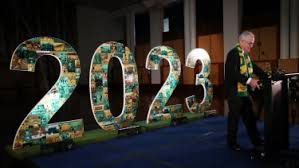By Andrew Warshaw
June 26 – Australia and New Zealand no doubt celebrated long into the night – or rather the morning given the time difference – after securing victory over Colombia to win the right to stage the 2023 women’s World Cup and make history by taking it to the southern hemisphere for the first time.
But almost as notable as their 22-13 victory over their sole rivals was the fact that every one of the nine European members on the FIFA Council cast their votes in favour of the South Americans, prompting FIFA president Gianni Infantino to express his surprise.
As predicted by this website and other media organisations ahead of Thursday’s ballot, the UEFA hierarchy mandated its members to opt for Colombia in the two-horse race, mainly in order to support a co-operation pact renewed in February between UEFA and Conmebol but perhaps also to strike some of deal when it comes to bidding for the men’s 2030 World Cup.
UEFA president Aleksander Ceferin, so often the voice of reason and commonsense, was one of those who personally endorsed Colombia’s candidacy. But pact or no pact, the move flew in the face of efforts in recent years to modernise the voting process following the highly contentious ballot 10 years ago for the 2018 and 2022 men’s World Cups which produced surprise winners in Russia and, in particular, Qatar.
Qatar won the right to stage 2022 despite being lowest-ranked in the evaluation process and had UEFA – which has constantly banged on about the need for greater transparency and accountability – got its way, Colombia would have upset the odds in exactly the same fashion as Qatar did in terms of winning despite having received a far weaker technical report in virtually every aspect.
It was little surprise, in the aftermath of Thursday’s ballot, that fingers were pointed in the direction of English Football Association chairman Greg Clarke.
It was the English, after receiving a mere two votes 10 years ago when bidding for the 2018 World Cup, who cried foul and subsequently welcomed a fairer, more modern approach to the voting process in order to allay suspicions of foul play.
Yet here were the English voting in favour of a patently weaker technical evaluation (though to be fair to Clarke he does go to the FIFA Council as a UEFA rather than English rep). Clarke’s vote was part of a collective decision by UEFA without whose bloc support Colombia would have been left with just five votes, a scenario not lost on Australian FA (FFA) chief executive James Johnson.
“I actually don’t find it very funny,” Johnson told Fox Sports. “I think that was quite disrespectful to be perfectly honest with you.
“It was a process that was, I think, run very well by FIFA … we scored very highly on a report that was an objective report. We know now what the voting was like, and I must say we are disappointed with the way that the (English) FA voted.”
Europe’s decision to snub the odds-on favourites also surprised Infantino who, along with Africa and North America, backed the trans-Tasman bid.
“At the end of the day you have to analyse the bids,” said Infantino who has been criticised by UEFA, often rightly, for some of his decisions but who this time had a point to prove.
“FIFA was criticised in the past for not giving enough attention to the technical evaluation,” he said.
“But we showed we did that for the 2026 (men’s) World Cup and we showed it again this time. These reports have to mean something. Otherwise we may as well appoint someone based on other criteria. I was surprised (by UEFA’s bloc vote).”
Infantino said consideration would be given to hosting the women’s World Cup every two years in order to “really boost women’s football. Maybe (a gap of) four years is too much.”
He also revealed, tellingly, that in future the FIFA Congress of all 211 national associations might decide Women’s World Cup hosts, just as it now does for the men.
“For the future maybe we should bring this decision to the FIFA Congress to decide because there is no reason to treat men and women differently. It doesn’t make sense to me. We can have a more democratic process among the member associations of FIFA.”
UEFA, predictably, defended its position.
“Even though the Colombian bid was not the one rated highest technically by FIFA, European members of the FIFA Council felt that it represented a strategic opportunity for the development of women’s football in South America thanks to the legacy and increase of attention for the women’s game that the tournament would bring to the continent,” a statement read.
“It was a choice between two countries – Australia and New Zealand – where women’s football is already strongly established, and a continent where it still has to be firmly implanted and has a huge development potential. It’s important to add that European members of the FIFA Council agreed to vote together on major issues as a matter of solidarity.”
Johanna Wood, the president of New Zealand Football said: “We believe we have been given a treasure, and we will look after that treasure. We will work towards putting women’s football even more front and centre on the world stage.”
And a delighted Chris Nikou, president of Football Federation Australia (FFA), added: “The FIFA Women’s World Cup 2023 in Australia and New Zealand will be ground-breaking in many ways.
“Not only will it be the first ever co-confederation hosted FIFA World Cup and the first ever FIFA Women’s World Cup in the Asia-Pacific region, but we will unlock the huge potential for growth in women’s football in the Asia-Pacific region.”
Contact the writer of this story at moc.l1714001971labto1714001971ofdlr1714001971owedi1714001971sni@w1714001971ahsra1714001971w.wer1714001971dna1714001971

